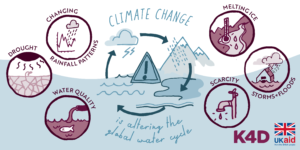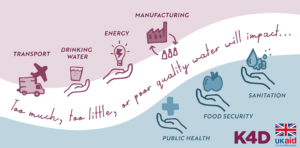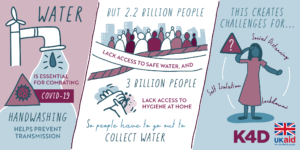
Water security is important for sustaining livelihoods, human well-being and socio-economic development. Safeguarding sustainable access to adequate quantities of acceptable water as well as ensuring protection against water risks rests on a number of elements including natural processes, infrastructure, institutions and governance.
Water insecurity is growing due to rising global water demands, climate change, urbanisation and environmental degradation. Growing water scarcity, variability, and poor water quality are impacting sustainable development in a number of ways, undermining economic productivity and human well-being. Household water insecurity is a key challenge for combatting disease, including the current Covid-19 pandemic.
The Water Security Learning Journey supported knowledge and understanding around these issues across FCDO.
The Climate Briefing Podcast: The nexus of water security and climate policy
Antony Froggatt, Carol Chouchani Cherfane, Sareen Malik
August 2022
Briefing Pack: Groundwater: Making the Invisible Visible
Kim Ozano, Andrew Roby, Alan MacDonald, Kirsty Upton, Nick Hepworth, John Matthews, Kathleen Dominique, Chiara Trabachhi, Chris Chijutomi, Zinhle Tshabalala, Deepa Joshi, Upandha Udalagama, Alan Nicol, GCRF Water Security Hub
March 2022
Briefing Note: Groundwater: Making the Invisible Visible
Kim Ozano, Andrew Roby, Alan MacDonald, Kirsty Upton, Nick Hepworth, John Matthews, Kathleen Dominique, Chiara Trabachhi, Chris Chijutomi, Zinhle Tshabalala, Deepa Joshi, Upandha Udalagama, Alan Nicol, GCRF Water Security Hub
March 2022
Reading Pack: Tackling the Global Water Crisis: The Role of Water Footprints and Water Stewardship
Nick Hepworth
August 2021
Find here key events and resources to reach the shared goal of fair water footprints by 2030 for climate resilient, inclusive, and sustainable development.
Helpdesk Reports
K4D Helpdesk Report 1116
Fair Water Footprint Stakeholder Mapping
Laura Bolton
31 March 2022
K4D Helpdesk Report 895
Water, Climate Change, and Conflict
Dr Rachel Cooper
10 June 2021
K4D Helpdesk Report 857
Water Finance and Nature-based solutions
Dr Rachel Cooper and Dr John H. Matthews
21 August 2020
K4D Helpdesk Report 813
Nature-based solutions for water security
Rachel Cooper
11 June 2020
K4D Helpdesk Report 803
Water Security beyond Covid-19
Rachel Cooper
April 2020
K4D Helpdesk Report 826
Water for the Urban Poor and Covid-19
Rachel Cooper
4 May 2020
Opinion pieces
How to improve safe access to water during and after Covid-19
Three ways to improve water security and climate change adaptation
Strengthening water security for pandemic preparedness
Videos
Mainstreaming Water Security and Climate Resilience ahead of COP26
Water experts talk climate and water with K4D ahead of COP26
Richard Clarke: Water at the heart of the agenda
John Matthews: Medium of positive change: activating climate & water
Infographics/social media graphics
Ways to improve water security and climate change adaptation
Infographic 1: Climate change and the global water cycle

Transcript of the image above (infographic 1):
Climate change is altering the global water cycle:
- Drought
- Changing rainfall patterns
- Water quality
- Melting ice
- Scarcity
- Storms and flood
Infographic 2: Poor quality water impacts

Transcript of the image above (infographic 2):
Too much, too little, or poor quality water will impact:
- Transport
- Drinking water
- Energy
- Manufacturing
- Public health
- Food security
- Sanitation
Infographic 3: Climate change mitigation interventions
 Transcript of the image above (infographic 3):
Transcript of the image above (infographic 3):
Water is essential for climate change mitigation and adaptation. Interventions include:
- Nature based solutions
- Climate-resilient water management
- Renewable energy
- Climate-resilient water sanitation and hygiene
Pandemic preparedness and building back better
Infographic 4: Water challenges created

Transcript of the image above (infographic 4):
Water is essential for combating Covid-19 – hand washing helps prevent transmission
But 2.2 billion people lack access to safe water, and 3 billion lack access to hygiene at home. So people have to go out to collect water.
This creates challenges for:
- Social distancing
- Self isolation
- Lockdowns
Infographic 5: Five ways to support water availability for the urban poor
 Transcript of the image above (infographic 5):
Transcript of the image above (infographic 5):
Five ways to support water availability for the urban poor:
- Additional pre-paid water sources – with social distancing measures in place & PPE for vendors
- Subsidising communal water point costs
- Regulating private suppliers – selling water at utility prices
- Digitising payments
- Fixing leaking pipes – to help increase supply
Infographic 6: Building back better after Covid-19

Transcript of the image above (infographic 6):
Strengthening water security is vital for building back better after covid-19. Actions for future water security:
- Nature-based solutions for supply & quality
- Climate resilient water management
- Affordable access to safe water, sanitation and hygiene
- Governance and finance
- Water security for future pandemics
- Water security for climate resilience
Please note that this Learning Journey has now ended.